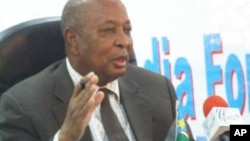President Salva Kiir has removed Finance Minister Aggrey Tisa Sabuni and replaced him with David Deng Athorbei, the man who headed the finance ministry from 2009 until the nation became independent in 2011.
President Kiir issued a series of decrees announcing the reshuffle on Monday. The first decree removed Sabuni as head of the finance ministry; the second appointed Athorbei as Sabuni’s replacement, and the third said Sabuni will now be a presidential adviser on economic issues. The decrees were all read out on state-run television on Monday night. No reasons were given for the change of guard at the finance ministry.
The mini-reshuffle comes just months ahead of general elections, scheduled for June 30. James Alic Garang, a senior economist at the Juba-based Ebony Center for Strategic Studies, said the polls might be a key reason for the changes in the finance ministry.
"The president may need a different hand, a different overseer, a different guidance with respect to the funding of elections," Alic told South Sudan in Focus. "If you bring in a new minister, the level of cooperation may be higher than the one that has been there for a long time.”
Sabuni's record in office
Alic said the reshuffle came as a surprise because Sabuni has performed well as finance minister. The Ebony Center analyst said the outgoing finance minister had no weaknesses that may have prompted his removal.
"Over the course of the last three months, there was a major improvement in tax revenue collections, non-oil revenue collection at the border," Alic said.
"It increased five times. This was due to the pressure from the minister of finance, the interior and other associated arms of the government," Alic said, attributing much of the improved tax collection effort to Sabuni.
But Sabuni has also been the butt of criticism, notably over delays in the release of funds to different government agencies.
"Pensioners did not receive their salaries for two to three months... I am also told that the army has some complaints. They have not received also adequately as they wish. So these small things added up and when they do, for someone who has been here, maybe it is time to go," he said.
Alic noted that the new finance minister will take office at a time when the price of oil - the main source of government revenues for South Sudan - is plummeting. The global price of crude has fallen by around 60 percent since June and was trading Tuesday at less than $50 a barrel.
Alic said Athorbei will have to make tough decisions and take firm action to ensure the government's revenue stream. He will also have to iron out the problems with non-payment of pensions and soldiers’ wages, Alic said.
“There are some little messes at the ministry of finance and I hope Deng Athorbei would literally pick up the broom and clean up both for the short term and for the long term," he said.
Athorbei was appointed head of the finance ministry in 2009, and reappointed by Kiir in 2010. He held the post until just after South Sudan became an independent nation in July 2011, when Kiir appointed a new cabinet.




